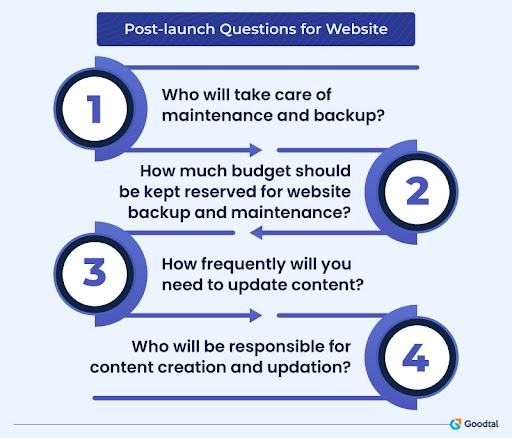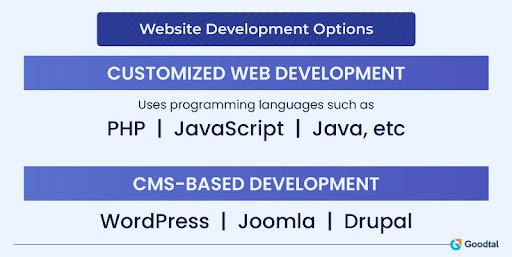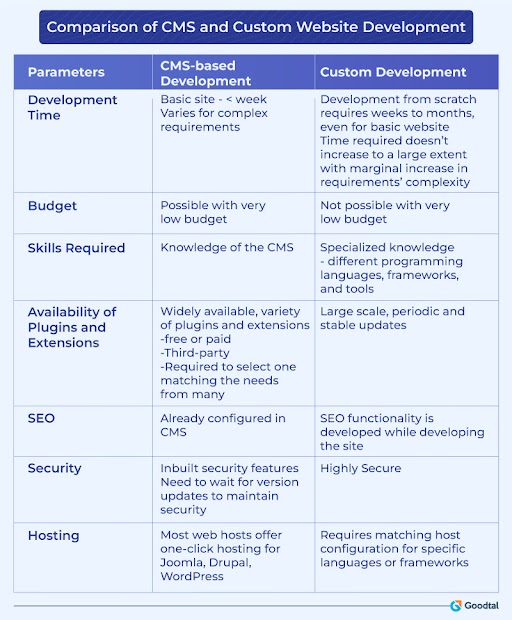
When discussing how to go for your first website, I won’t start with why a website is important or what role a website plays to get your business more online presence.
If you are reading this blog, you are among those who recognize the need for a website. So, coming to the next question, when we are going for our first business website development, we face the dilemma of whether to go for a custom website development from scratch or select a CMS-based website development. Let’s understand the parameters that will affect our decision.
Parameters That Govern Development of Your Website
The crucial concerns for all businesses while going for their first website development are the same, while some parameters might differ with your needs. Here are a few considerations that you must evaluate before you begin development.
Budget
Every business has a budget and all activities we do for the growth of the business must fit the budget limits. Thus, when developing your first website, you must assign an appropriate budget. Remember, the more feasible this budget is, the better will be the outcomes and RoI. Spending too less on a website can compromise its quality and harm its purpose. However, assigning too must budget for the website unreasonably will affect the cost-benefit ratio. So, plan it well!
Time
Website development is essential for almost all businesses. When you have decided that you need a website, it’s not feasible to wait for a long time. If you are using the ready tools, basic website development anyhow is not a very time-consuming process and you can increase the scope of the website further with time. For example, an expert WordPress developer can develop your website in less than a week. So, you need to note down your requirements for the website and decide a timeframe in which you want your site to be ready and functional.
Post-development Resources
Website is a long-term asset and so we need to plan what are we going to do with the website post-launch. You must also answer these questions.

Answers to these questions take you to the next step, i.e., the selection of the development model!
Website Development Models: CMS-based Development & Custom Development
If you need to develop and create and update content frequently on your website, you will need people to do that. Similarly, maintenance of the website and backup require specialized skills. The level of specialization or skills required for maintaining your website will depend on the type of development you choose. There are mainly two types of website development models:

The above models differ in many ways. Both of the models have their advantages and limitations. However, the selection is largely based on your requirements and so businesses must know how the custom-development is different from CMS-based development. This information will help you select the development that matches your needs.
Ease of Use
A Content Management System (CMS) comes with user-friendly interfaces that make it easy even for not-so-experienced developers to build a website. It enables quick development without in-depth knowledge of different programming languages. And, though very complex websites may not be possible using CMS, high-featured, common functionality websites are possible. This naturally implies that developing a website with complex requirements is better with custom development using one of the top programming languages such as Java, JavaScript, PHP, and more.
Easy to Learn
A CMS-based basic website is generally easier to maintain post-development for non-technical people. It offers different modules for managing a variety of content including text, images, videos, etc. Most CMS also offer different levels of user authentication such as admin for backend and configuration management, editor for content approval, and user for posting content. So, businesses requiring multi-level user management and simple content-driven websites go for Joomla developers for quick, easy, and budget-friendly solutions.
This does not imply that a custom-developed website cannot have such modules. As such if you can provide a clear picture of your requirements to the developer, all such modules can be developed. However, if you are experimenting with your first website and do not know what modules you might require and still you want to go for all the basics that common websites have, it’s better to start with CMS-based development.
No Coding Required
If you use CMS for website development, you need not know in-depth coding. For minor changes and configuration, knowledge of coding helps though. But, for simple, content-driven websites, coding is not required.
However, if your website is custom developed, you will need a developer for all the changes and updates that you may need in your website even after development. Also, you will need developers who will understand the website structure and the programming language. So, most businesses plan a maintenance contract for further website development needs with the same web development partner who built their site.
Built-in Templates and Design Elements
CMS offers built-in templates and design elements that help you develop a professional-level website quickly and easily. It also gives you access to a variety of designs to choose from, some of which were never even visualized by you or possible for you to develop. And a variety of content management systems are available that offer a range of capabilities. Even if you need an advanced website developed using CMS, Drupal development companies can get you the required results. In custom development, all such templates and design elements have to be specifically and separately developed to match your requirements.
Plugins and Extensions
Since the CMS have evolved with changing web development requirements over the years, they have plugins or extensions available for almost all common functionality required for different website purposes.
So, when you select CMS-based development, you don't need to code especially for adding authentication, user management, shopping cart, product display galleries, and a lot more. These are available in such a large variety for popular CMS such as Joomla, WordPress, Drupal, etc., because these CMS have been popular for years, and so many developers all over the world have been persistently building plugins and extensions for these CMS.
The advantage is that if you realize the need for another common functionality after your basic website is functional, your developer need not go for developing the functionality from scratch. He can just search for the available plugins or extensions and select the one that best meets your needs. In custom development, your developers must develop the functionality from scratch and integrate it with the existing website without affecting its performance.
Suggested Reading: CMS 101: All You Need to Know
Scalability
CMS makes it easy for your website to grow with increasing needs. So, you can easily add more users, content, or even functionality without affecting the website performance and also without having to develop it all over again. This is though possible with custom development as well if you have selected experienced developers for your project and have conveyed to them that you need a scalable website.
Search Engine Optimization
Most popular CMS have evolved through the times from those when SEO concepts were primitive and optional, to the present times when SEO is almost compulsory for a website’s success. So, they incorporate all the tools and parameters that are essential for search engine optimization of your website and content. In custom development, you need experienced developers who understand the need for an SEO-friendly website and are capable of integrating all functionality to make your website SEO-friendly.
Security
Similar to SEO, all generations of CMS have improved over the previous on security as the need for security changed and increased with changes in technology and trends. So, while developing a website from scratch, you will have to plan and implement security measures. CMS offers these basic measures as a part of the package. However, if you are going with a high-quality custom-website development through experienced developers, they might be quicker in implementing security measures with change in times and security requirements as they need not wait for updation of the CMS versions or the versions of templates, plugins, and extensions.
Suggested Reading: Top 8 Web Development Trends to Look Forward to in 2022
Hosting
Most hosting providers offer easy and quick installations of CMS packages. So, even non-technical people can develop their basic websites using CMS. However, for adding features, functionality, or customization, it is essential to go with the experts in CMS-based website development.

Still, I Have a Question!
Despite all this, if you have a question on whether you should choose CMS-based development for your first and basic website, you must also know some limitations of CMS-based website development.
Limitations of Using CMS for Website Development
Here is a summary of the limitations of CMS-based website development. This list will though not convince you to avoid CMS-based development, it will, however, help you evaluate whether this limitation applies to you or you may ignore it based on your needs.
Limited Customization
Despite access to inbuilt templates and design elements, there is a limit to customization with ready-to-use website development CMS. This is when the role of Joomla developers, WordPress developers, and Drupal developers comes into the picture. They are skilled in comprehensive customization of these CMS packages to match your requirements and changing needs while your website is functional and you don’t want to go for redevelopment.
Dependence on Third-party Themes and Plugins
Though there is a large variety of themes, plugins, etc., available with the most popular CMS, there are limitations to the use of these. The first limitation is the availability of updated versions. For example, if Joomla has just upgraded to the newer version, it doesn’t imply all your plugins are compatible with this version. Your plugins also need to be upgraded to suit these changes else the plugin will not perform well with the new version of Joomla, making your website perform poorly. It can also cause security vulnerabilities with bugs as some plugins might stop working altogether.
Performance
CMS relies on databases and complex back-end systems. These can lower the performance in real-time peak loads compared to a custom-developed website that has been developed considering the highest real-time load situations. So, CMS may not be very appropriate for developing websites for public utility services or community services that are expected to host a large number of users with real-time transactions.
Learning Curve
It is not so easy for a newbie to get accustomed to in-depth CMS such as Joomla, etc. It takes time for them to learn the CMS, its structure, customization, etc. Moreover, it may require days or weeks of trial-and-error for testing different plugins and templates and deciding which one matches your needs. So, having access to too many resources is also a challenge.
Limited Control
Some CMS limit your control over the layouts, design, and functionality of your website. So, many businesses who want to offer unique and distinctive websites, do not prefer to use CMS for website development.
Additional Costs
While there are a variety of templates, themes, plugins, extensions, etc., available with the popular CMS packages, not all of these are free. Most such extensions that match your specific needs come with a fee, and you will have to keep paying the fee for updated versions or whenever you select another plugin. So, through the entire lifetime of your website you need to pay the fee for all the chargeable plugins and extensions that you are using on your website.
Wrapping Up!
Whether to go for custom or CMS-based website development is a debate that has existed for ages, also because there cannot be a definite answer that fits all in this matter.
If the above comparison puts you in a position where you feel that both modes of development could be equally feasible for your needs, you just need to take a stand and go with the best developers who are skilled and experienced in the relevant domain. Generally, developers are also capable of suggesting whether your requirements will be met with CMS-based development or if you will need to go for custom development.
Goodtal will help you find some of the best developers for both custom web development, and, CMS-based development including Joomla development, WordPress development, Drupal development, and more.
